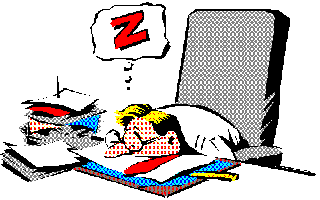Last Updated: May 29, 2006
INFORMATION ABOUT
UNEMPLOYMENT COMPENSATION
![]()
In most states individuals who lose their jobs through no fault of their own are entitled to collect unemployment compensation benefits for the applicable benefit period (26 weeks in Pennsylvania) or until they find a new job, whichever is less.
We hope that the questions and answers presented here will assist you in familiarizing yourself with Unemployment Compensation issues and terms. While the material below attempts to answer common questions in this area based upon general Unemployment Compensation law, State and local laws may significantly modify the facts set forth. Because all legal problems are unique, nothing provided here is a substitute for the advice of competent counsel. We strongly urge you to consult with an attorney licensed to practice in your state about any particular legal problem you may have.

WHAT IS UNEMPLOYMENT COMPENSATION?<
![]() Unemployment
Compensation is a state mandated program that exists to provide funds to
persons who become unemployed through no fault of their own.
Unemployment
Compensation is a state mandated program that exists to provide funds to
persons who become unemployed through no fault of their own.
WHO PAYS FOR UNEMPLOYMENT COMPENSATION?
![]() Unemployment
Compensation is paid from the State Unemployment Compensation Fund. Contributions
to the Fund are made by employers throughout the state, in accordance with a
formula that accounts for the number of employees, total wages paid, and
average claim benefits paid. In some states, employees are also required to
contribute to the Fund by way of payroll deduction.
Unemployment
Compensation is paid from the State Unemployment Compensation Fund. Contributions
to the Fund are made by employers throughout the state, in accordance with a
formula that accounts for the number of employees, total wages paid, and
average claim benefits paid. In some states, employees are also required to
contribute to the Fund by way of payroll deduction.
WHO IS ELIGIBLE FOR UNEMPLOYMENT COMPENSATION?
![]() In
order to be eligible to receive benefits,
In
order to be eligible to receive benefits,  one must:
one must:
· Become unemployed, generally through no fault of his or her own;
· Register with and continue to report each week to the local employment office;
· Be available for suitable work.
HOW LONG MUST A PERSON WORK TO BE ENTITLED TO STATE UNEMPLOYMENT COMPENSATION?
![]() As
opposed to federal unemployment compensation, which is uniform throughout the
United States, state unemployment compensation is a State-administered program
resulting in different laws and guidelines from state to state. Generally, you
must be employed with an employer for at least fifteen weeks before you may
submit a claim for unemployment compensation. However, where the requisite
length of employment has not been met, some states take into account your
length of employment with the employer preceding your last employer.
As
opposed to federal unemployment compensation, which is uniform throughout the
United States, state unemployment compensation is a State-administered program
resulting in different laws and guidelines from state to state. Generally, you
must be employed with an employer for at least fifteen weeks before you may
submit a claim for unemployment compensation. However, where the requisite
length of employment has not been met, some states take into account your
length of employment with the employer preceding your last employer.
HOW IS THE AMOUNT OF MY COMPENSATION DETERMINED?
![]() In
Pennsylvania, the amount of Unemployment Compensation is based upon your actual
earnings from employment during the Base Year, which is defined as the first
four of the last five completed calendar quarters immediately preceding the
first day you are eligible for benefits. Thus, if you are terminated from
employment on January 1, 1996, the last five calendar quarters would include
the period from October 1, 1994 through December 31, 1995. The first four of
those last five quarters would be from October 1, 1994 through September 30,
1995. Earnings during that Base Year form the basis upon which your
Unemployment Compensation benefits will be calculated.
In
Pennsylvania, the amount of Unemployment Compensation is based upon your actual
earnings from employment during the Base Year, which is defined as the first
four of the last five completed calendar quarters immediately preceding the
first day you are eligible for benefits. Thus, if you are terminated from
employment on January 1, 1996, the last five calendar quarters would include
the period from October 1, 1994 through December 31, 1995. The first four of
those last five quarters would be from October 1, 1994 through September 30,
1995. Earnings during that Base Year form the basis upon which your
Unemployment Compensation benefits will be calculated.
HOW LONG CAN I COLLECT BENEFITS?
![]() Generally,
claimants who remain eligible may get benefits for up to 26 weeks of total
unemployment. If you did not work enough weeks in which you earned at least
$50.00 in the 52-week period before your application, then you might be
entitled to less. In Pennsylvania, you may also qualify for an additional 8 to
13 weeks of additional benefits.
Generally,
claimants who remain eligible may get benefits for up to 26 weeks of total
unemployment. If you did not work enough weeks in which you earned at least
$50.00 in the 52-week period before your application, then you might be
entitled to less. In Pennsylvania, you may also qualify for an additional 8 to
13 weeks of additional benefits.
You must report to the Office of Employment Security each week to sign up for weekly checks.
CAN I GET PARTIAL BENEFITS?
![]() If
your regular work hours are reduced because of lack of work, you may be able to
receive partial benefits. You can earn up to 40% of the weekly benefit rate or
$6, whichever is greater, without reducing your benefits. Any amount you earn
over this in any week will be deducted from your weekly benefit rate.
If
your regular work hours are reduced because of lack of work, you may be able to
receive partial benefits. You can earn up to 40% of the weekly benefit rate or
$6, whichever is greater, without reducing your benefits. Any amount you earn
over this in any week will be deducted from your weekly benefit rate.
If you fail to report all wages, you may be disqualified from receiving benefits and you may be subject to fines or imprisonment.
CAN I COLLECT BENEFITS IF I AM PREGNANT?
![]() If
you are pregnant, you can collect U.C. benefits only if you do not voluntarily
leave your job. If you are able to work and suitable work is available, but you
leave just because you are pregnant, you are not entitled to unemployment
compensation as a general rule. If your employer discharges you because of
pregnancy, you are entitled to benefits. Benefits may continue after the baby
is born if you are available to work and otherwise eligible for benefits.
If
you are pregnant, you can collect U.C. benefits only if you do not voluntarily
leave your job. If you are able to work and suitable work is available, but you
leave just because you are pregnant, you are not entitled to unemployment
compensation as a general rule. If your employer discharges you because of
pregnancy, you are entitled to benefits. Benefits may continue after the baby
is born if you are available to work and otherwise eligible for benefits.
ARE BENEFITS TAXABLE?
![]() Yes.
All U.C. benefits must be reported on your Federal Income Tax return. Depending
on your tax situation and other income and expenses, these benefits may be
taxable.
Yes.
All U.C. benefits must be reported on your Federal Income Tax return. Depending
on your tax situation and other income and expenses, these benefits may be
taxable.
ARE THERE PENALTIES FOR FRAUD?
![]() Yes.
You can be prosecuted if you make false statements or knowingly withhold
information in order to illegally obtain benefits. If convicted
Yes.
You can be prosecuted if you make false statements or knowingly withhold
information in order to illegally obtain benefits. If convicted
· you must repay the entire amount received, and if not, a lien can be filed against you;
· you can be fined and jail time can be imposed for each check illegally obtained;
· you will be ineligible to receive U.C. for one year after the conviction.
HOW DO I APPLY FOR BENEFITS?
![]() You
must personally go to your local
You
must personally go to your local  Unemployment Compensation
Office and fill out the proper forms. A listing of employment offices is
usually found in the blue pages of your local telephone book. You will be asked
the date of the last day worked, the length of employment, and why you lost
your job.
Unemployment Compensation
Office and fill out the proper forms. A listing of employment offices is
usually found in the blue pages of your local telephone book. You will be asked
the date of the last day worked, the length of employment, and why you lost
your job.
WHAT HAPPENS NEXT?
![]() The
employment office will notify your former employer of your application, and ask
why you left your job with that employer. If your former employer responds in a
way that indicates you are not entitled to benefits, your claim may be denied.
You may file an immediate appeal and the local employment office will make an
initial determination as to your eligibility for benefits.
The
employment office will notify your former employer of your application, and ask
why you left your job with that employer. If your former employer responds in a
way that indicates you are not entitled to benefits, your claim may be denied.
You may file an immediate appeal and the local employment office will make an
initial determination as to your eligibility for benefits.
Either party may file an appeal from the determination of the local employment office. If an appeal is filed, a hearing will be scheduled before an Unemployment Compensation Referee. The Referee will conduct an evidentiary hearing and issue a written decision.
WHAT WILL THE REFEREE BE ASKED TO DECIDE?
![]() Most
contested claims for Unemployment Compensation raise one of the following two
issues:
Most
contested claims for Unemployment Compensation raise one of the following two
issues:
· Your former employer asserts that you quit or resigned, as opposed to being involuntarily terminated. If the Referee finds a voluntary resignation, you are not eligible for benefits.
·
Your former employer asserts that  you were fired for willful
misconduct. If the Referee determines that your termination was due to willful
misconduct, you are not eligible for benefits.
you were fired for willful
misconduct. If the Referee determines that your termination was due to willful
misconduct, you are not eligible for benefits.
In most states, the doctrine known as "Employment at Will" permits an employer, at any time and for any reason, to terminate any employee who is not covered by a union's collective bargaining agreement or by an employment contract. If covered by one of these agreements, then generally one would have to review the terms of that agreement to see whether termination is proper. This doctrine is known as "Employment at Will". An employer's right to terminate an employee pursuant to the "employment at will" doctrine is different than the employer's right to successfully challenge entitlement to Unemployment Compensation benefits for willful misconduct. Frequently, an employer may be well within its rights to terminate an employee due to some conduct which the employer finds objectionable or offensive. Such conduct, however, may not rise to the level of "willful misconduct" in order to bar you from collecting Unemployment Compensation benefits. If your conduct does not rise to the level of "willful misconduct," then although the termination was lawful,Unemployment Compensation benefits must be paid. The Unemployment Referee will make the determination.
WHAT WILL HAPPEN AT THE REFEREE HEARING?
![]() Both parties will testify in
person before
Both parties will testify in
person before  the Referee. Each will
have an opportunity to explain the circumstances surrounding the termination from
employment, and state why Unemployment Compensation benefits should or should
not be paid. Each will be examined by the other's attorney. After you and any
witnesses on your behalf testify, your former employer may present witnesses in
support of its position. Both attorneys will then be permitted to cross-examine
each other's witnesses.
the Referee. Each will
have an opportunity to explain the circumstances surrounding the termination from
employment, and state why Unemployment Compensation benefits should or should
not be paid. Each will be examined by the other's attorney. After you and any
witnesses on your behalf testify, your former employer may present witnesses in
support of its position. Both attorneys will then be permitted to cross-examine
each other's witnesses.
WHAT HAPPENS IF THE REFEREE RULES AGAINST MY CLAIM?
![]() You can file an appeal form at the Office of Unemployment
within 15 days of the Referee's decision against U.C. Your employer is also
entitled to do this if the referee rules in your favor and the employer
disagrees with the ruling.
You can file an appeal form at the Office of Unemployment
within 15 days of the Referee's decision against U.C. Your employer is also
entitled to do this if the referee rules in your favor and the employer
disagrees with the ruling.
DO I NEED AN ATTORNEY?
![]() We recommend that you hire an attorney as soon as it becomes
apparent that there is a contest regarding entitlement to Unemployment
Compensation benefits. Your attorney will be able to counsel you in the filing
of the proper paperwork and if a hearing becomes necessary, your attorney will
make sure that all the evidence in your favor is presented in the most
effective way possible to maximize the likelihood that you are successful.
We recommend that you hire an attorney as soon as it becomes
apparent that there is a contest regarding entitlement to Unemployment
Compensation benefits. Your attorney will be able to counsel you in the filing
of the proper paperwork and if a hearing becomes necessary, your attorney will
make sure that all the evidence in your favor is presented in the most
effective way possible to maximize the likelihood that you are successful.
HOW IS MY ATTORNEY PAID?
![]() Attorneys expect to be paid for their services. You should
discuss with your attorney whether he or she will accept a fixed or flat fee for
representing you or whether he or she wants to be paid for the actual amount of
time spent working on your case, known as "hourly billing". It is
highly unlikely that your attorney will agree to a contingent fee arrangement
for an unemployment compensation case. As in all cases where you retain an
attorney, the two of you should agree on the fee arrangements in writing before
any work is done on your case.
Attorneys expect to be paid for their services. You should
discuss with your attorney whether he or she will accept a fixed or flat fee for
representing you or whether he or she wants to be paid for the actual amount of
time spent working on your case, known as "hourly billing". It is
highly unlikely that your attorney will agree to a contingent fee arrangement
for an unemployment compensation case. As in all cases where you retain an
attorney, the two of you should agree on the fee arrangements in writing before
any work is done on your case.
DESSEN, MOSES & ROSSITTO is happy to assist you in any Unemployment Compensation matter that arises in either Pennsylvania or New Jersey, the two states in which our attorneys routinely practice. If you have other questions or comments about unemployment compensation or any other area in which we practice, please send us an E-mail message with your questions or comments and we will be happy to try to assist you.
![]()
LINKS TO OTHER INTERESTING INFO
Bureau of Labor Statistics
Employees Benefits Law
Employees Benefits Research Institute
![]()
Top of Page | DM&R Home Page
| Legal Article Wall
About DM&R | To Retain
DM&R | Ask Us A Question
![]()
Copyright © 1996 -
2006 Dessen, Moses & Rossitto
All rights reserved.



